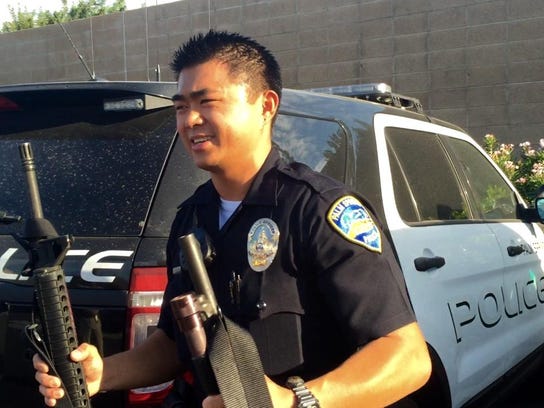PALM SPRINGS, Calif. — Police officer Daniel Buduan moves fluidly around the police cruiser, placing an assault rifle he’s just inspected in the vehicle in preparation to ride along with his sergeant. Buduan is a rookie, but he’s a fast learner.
Buduan’s department could use a dozen more like him. A hiring crunch has left police departments throughout California thirsty for new recruits and Buduan is one of the few young people getting into policing during what police unions say is a tough recruiting period.
Open positions for law enforcement professionals in California have increased by 603% since 2010, according to the Peace Officer Standards and Training government job listings. By comparison, during the same time period, the Bureau of Labor Statisticsrecorded a 7% increase in open firefighting positions. Several factors are adding to the equation: a post-recession boom in job openings, lack of qualified candidates, change in pension plans, and, to a certain extent, the increased scrutiny police are facing nationwide.
“This is unheard of,” Palm Springs Lt. Mike Kovaleff said. “You can pretty much pick a place on the map in California and see that they’re hiring. … We are in a hiring crisis in the state of California.”
Part of the hiring gap can be blamed on post-recession funding that’s opened departments up to posting more vacancies, but a more pressing issue is the shrinking number of people who want to work in law enforcement.
Answers for a lack of interest in police work are few, but eroding confidence in law enforcement, economic recovery and less appealing benefits packages are blamed across the board.
Sentiment towards police in the post-Ferguson era has made the job less attractive, some officials said.
In the classroom, Dr. Larry Gaines, who chairs the Criminal Justice Department atCalifornia State University San Bernardino, said there’s no shortage in local students who are interested in criminal justice. He cautions officials from pinning a shrinking pool of candidates solely on a more critical public eye without definitive studies, and argues a more cyclical reason for the problem.
“I would say it’s economics more than anything else,” Gaines said.
Citing decreased unemployment rates, Gaines said difficulties hiring may stem from opportunities emerging in the improved job market.
Policing has always been a difficult job, but with excellent benefits and overtime opportunities that can easily net a new officer a six-figure salary, enough people are generally drawn to the field to prevent this level of problem.
The recent public service pension reform in some California cities has been a huge detriment to bringing new people into the department, however.
Retirement ages have been pushed back as much as seven years for new recruits and five for lateral department transfers in many cities.
Plan changes have had a dramatic effect across the state. Four years ago, a measure passed in San Jose reduced benefits for all city employees. The result — a mass exodus of 400 officers — was catastrophic enough that the city soon reversed the reduction.
Getting the jump on the few remaining candidates before others means making an effort unlike many departments have made in recent memory.
Departments in Beverly Hills and Santa Cruz are even offering $10,000 to $20,000 signing bonuses for lateral transfers.
Even in this time of desperation, Desert Hot Springs police Chief Dale Mondary said he’s still looking for the best and brightest for his department — a person who can remember the moment that inspired a passion for law enforcement like Buduan’s memory of that bullet.
“I don’t just want an officer, I want the officer,” Mondary said.

